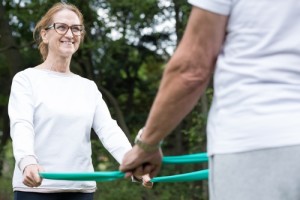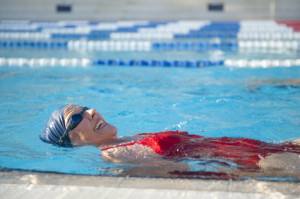While there are numerous popular diets for Crohn’s disease and several treatments and therapies, there are also prescriptions of physical exercise for people with Crohn’s that may be potentially beneficial. Research has it that finding the right kind of exercise routine for Crohn’s can be significantly helpful in identifying symptoms. Additionally, exercise training may also be helpful in reducing stress and other Crohn’s symptoms.
Regardless of whether or not you have Crohn’s, exercise is a given for a healthy and fit lifestyle. It also improves your mental health and it may even prevent you from future illnesses or diseases.
 Here are the top exercises that are best for people with Crohn’s:
Here are the top exercises that are best for people with Crohn’s:
Resistance training
Since muscle-strengthening exercises and activities are vital for staying fit and strong, incorporating these in your weekly or daily workout routine will help you stay physically fit and stress-free. According to numerous studies conducted on the effects of physical exercise on people with Crohn’s, resistance training is referred to as the ‘gold standard’ when trying to improve body composition and preventing bone mineral loss.
This form of exercise can typically involve using machines, free weights or elastic workout bands. Common exercises include squats, crunches, lunges, push-ups, chest presses, back extensions, etc. Doing a couple of sets of these exercises in each session can help relieve fatigue and can directly affect your energy levels as fatigue and dullness are a few of Crohn’s symptoms.
Cycling
While research is still being conducted on the possible effects of exercise on people with Crohn’s, researchers concluded that moderate intensity exercise training like cycling is the most commonly used method for long term conditions like Crohn’s. For instance, 30 minutes of moderate continuous cycling three times a week is most likely to help keep Crohn’s symptoms in check.
Other research and evidence conducted is also showing that instead of moderate intensity, high intensity interval training like a repeated session of 1-minute hard cycling followed by 1-minute easy cycling is more beneficial; it is also more likely to have a greater effect on one’s health and fitness.
Cycling also offers cross training and some diversity in your regular workout routine where it helps build stamina and diminishes symptoms of bloating and gas, commonly associated with Crohn’s.
Moderate aerobic exercise
High-impact workouts and exercises can possibly leave you exhausted and completely drained of all energy if you have Crohn’s, therefore, low impact moderate exercise is best for you. This may include walking for half an hour every day or on alternate days.
A study published in the American Journal of Gastroenterology found that people with Crohn’s observed and experienced a significant improvement in their symptoms when they walked at a moderate pace three times a week. These participants also witnessed substantial improvements in their overall quality of life.
Another study from the Clinical Journal of Sports Medicine witnessed that Cohn’s disease patients, who did low-intensity walking in a 3-month study, observed immediate benefits without any exacerbations of their symptoms or any kind of flare-ups.
Yoga
Needless to say, yoga is probably the most popular and common form of exercise that leads to an all-around positive effect on your mental, physical and emotional health. Yoga has been found to be extremely helpful and useful especially for people with Crohn’s. Yoga attempts to combine particular breathing techniques and also carefully controlled movements. It is also a kind of meditative process that can relax your mind and body to a great extent. Thus, doing yoga when you have Crohn’s can significantly lower your stress levels and can also help you maintain balance and flexibility.
Moreover, besides helping with digestion and leading to a healthier lifestyle, yoga also helps calm symptoms down, keeping them in check and it also heals the pain that Crohn’s disease patients sometimes go through.
Running
Apparently, running may seem like a high-impact form of exercise that can worsen your condition, however, it can actually be very helpful when you have Crohn’s. You might not know this but running can do wonders in giving you the mental and physical strength you need to keep going and can also relieve your symptoms of fatigue and dullness.
Also, contrary to the popular belief that running can make your symptom worse, doctors are of the opinion that running does not and will not make you sicker. In fact, it kind of boosts your metabolism and keeps your digestion under control too.
For patients who frequently report higher levels of stress and a lower quality of life, this kind of physical exercise improves their psychological health by reducing their levels of stress, anxiety and depression; consequently, they feel better about themselves and their lives.
Swimming
 Another low-impact form of exercise, swimming has been positively associated with diminishing symptoms that occur in Crohn’s disease. One of the most common symptoms of Crohn’s is intermittent pain in the abdominal area that is often caused by the inflammation of the intestines. Swimming has been found to be highly effective in relieving that pain.
Another low-impact form of exercise, swimming has been positively associated with diminishing symptoms that occur in Crohn’s disease. One of the most common symptoms of Crohn’s is intermittent pain in the abdominal area that is often caused by the inflammation of the intestines. Swimming has been found to be highly effective in relieving that pain.
Research suggests that extended swimming exercise can induce analgesia in people with Crohn’s by significantly reducing inflammatory and peripheral neuropathic pain. Scientific evidence also suggests that cold water swimming is increasingly effective in curtailing symptoms of Crohn’s disease.
Doctor Mark Harper, a consultant anesthetist at Brighton & Sussex University Hospitals, believes that in conditions like Crohn’s, the body’s stress response is actively helped by cold water swimming. Cold water is also considered a mild stressor that activates the immune system and is likely to increase white blood cell counts in people.
While there are several other low-impact exercises that work best for people with Crohn’s, the ones mentioned here are the most highly recommended. They also work to effectively diminish the symptoms of the disease, however moderation is the key. Therefore, avoid overdosing yourself on exercise or better yet, hire a personal trainer skilled in working with people who have Crohn’s disease.
Alycia Gordan is a freelance writer. She loves to read and write article related to health and lifestyle, sometimes on health-tech as well. She is crazy about chocolates and you can find her on Twitter: @meetalycia
